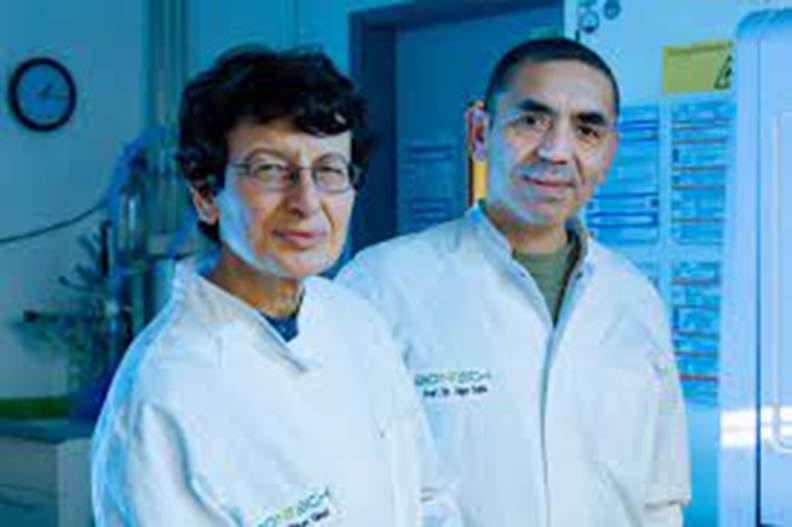
Ugur Sahin (right) and Ozlem Tureci - The Times
The Couple Behind Pfizer’s Covid Jab Plot Their Next Miracle
By Laith Al-Khalaf
“Let me show you,” the chief executive said, striding over to a whiteboard hanging on the wall of a small office at the company’s headquarters, 40km from Frankfurt. Grabbing a faded green marker, Sahin, 58, started scribbling a series of arrows, symbols, and numbers in a timeline to illustrate the problem faced by BioNTech in early 2020: how was it going to develop, test and scale up a vaccine for billions of people — for a disease that had only been known to scientists for a matter of months?
Phrases such as “GMP manufacturing” and “spike protein” were flying around until, perhaps noticing my baffled expression, Tureci, 56, the company’s chief medical officer, interrupted her husband to explain more intuitively: “It is like trying to write a movie script without knowing who the main characters are.”
But it was a challenge to which the pair rose. The company would go on to administer 4.5 billion doses of its jab, saving perhaps millions of lives and generating about $17 billion (£13.4 billion) in revenues for BioNTech in 2022 alone.
The success propelled a niche German biotech company, and its unassuming co-founders, to worldwide fame and fortune. But fast forward four years, and BioNTech is at another pivotal moment. As Covid recedes, revenues from its jab — the company’s only commercial product — have started to dry up. Its share price has fallen by about 73 percent from its 2021 high, and it has just announced that it expects to generate revenues of about €3 billion in 2024, nearly €1 billion less than expected.
Sometime back Sahin headed to San Francisco to address JP Morgan’s hugely influential healthcare conference and reassure the world that his company was no one-trick-pony. The future for BioNTech, he declared, was its cancer vaccines, ten of which it hopes to launch in 2024. But with such cures still in the trial stage, there is no shortage of doubters.
In many ways, BioNTech is a victim of its own success. The high efficacy of its Covid jab has meant that few people have needed to take regular boosters — with the resulting side-effect that the company cannot rely on the vaccines for long-term sales.
It is not alone — the share price of Pfizer , its Covid vaccine partner, has halved since 2021 — but after 175 years of existence, Pfizer has a lot else in its medicine cabinet to buoy revenues. The challenge for the younger Covid stars BioNTech and Moderna (whose shares are down 76 percent from their 2021 high) is convincing investors that they can replenish those revenues.
Sahin and Tureci’s pitch is clear: let us use our enormous Covid windfall to fund our cures for cancer.

The Times
When The Sunday Times travelled to their headquarters in Mainz on the aptly named An der Goldgrube street — meaning “at the goldmine” — the spoils from BioNTech’s success were plain to see. Its vast tax receipts from the vaccine have paid for the construction of the sleek new electric buses that whizz through the grey city center. Hospitals have been refurbished and the city’s debts repaid, all thanks to BioNTech’s vaccine miracle.
Neither Sahin nor Tureci dress like biotech billionaires or scientific geniuses: Sahin is wearing a nylon grey fleece, blue jeans, and running shoes. The bike that he has owned for nearly 20 years, and which he often rides to the office, is parked in an adjacent room, along with his helmet. Tureci wears similar jeans, a striped buttoned shirt, trainers and thin-framed glasses at the end of her nose. Both speak English with a wide vocabulary and pronounced German accents.
They grew up as part of what Germans call the “ Gastarbeiter ”, a generation of “guest workers” who immigrated to Germany from Turkey in search of work between the mid-1950s and the 1970s.
Sahin was born in the Turkish Mediterranean city of İskenderun, but his family left for Germany when he was about four. Both his parents ended up taking jobs in the local Ford plant— working long hours without childcare and leaving Sahin at a loose end. He occupied his afternoons in a Catholic church that had a large library of science books. “It was not an academic family, but I had all the freedom to follow my interest,” he said.
About 90km away, his future wife was also fostering a love of science. Tureci was born in the German city of Siegen. The family lived opposite the local hospital, where her father worked as both a surgeon and a GP. Tureci remembers spending those years either in operating theatres or in the living room, where her father would often examine his patients.
“I grew up seeing patients. Because my parents were so busy and we did not have nannies, I was with him in the operations — this used to be allowed,” she laughed.
The pair met on a cancer ward at Saarland university hospital, where Tureci was working as part of a placement during her medical studies, and Sahin was practicing as a doctor. It was far from love at first sight.
“To be completely honest, in the first few weeks he really bossed me around,” said Tureci. But she was soon charmed by how Sahin interacted with his patients: “Even if the ward was busy, he would sit down with each patient and see them as more than just numbers.”
Sahin said: “It was the typical situation — you are not looking for a partnership, but then realize that you are somehow blessed to meet a person who is so fitting to your life and your mindset.”
Their current plan to find cancer cures is nothing new. The pair had founded BioNTech in 2008 for that purpose, specifically using the technology known as mRNA , or messenger RNA. While most vaccines require scientists to spend years creating a protein to attack a virus directly, mRNA uses a single strand of the genetic material of the virus to teach the body to create a protein that can attack it. The approach slashes the time needed to develop a vaccine. “It is conceptually beautiful,” said Sahin.
The couple’s idea was to apply this to oncology — where they would obtain a blood sample and tumor biopsy from a cancer patient, unravel the genetic material of both and produce a specific, personalized vaccine within a matter of weeks. Tureci said this will be more effective than the blunt instrument that is chemotherapy: “The personalized vaccine concept addresses the root cause. Why don’t cancer treatments cure everyone? Because each and every cancer is different.”
For many years, it was niche science — eight years ago, the couple were extolling the benefits of the technology to conferences of a mere 150 people. But that all changed in 2020 when the couple decided to put much of their company’s cancer work on hold and shift overnight to fighting Covid-19. “We were so scared by the ‘horror scenario’ afflicting the whole world,” Tureci recalled.
What could a small biotech company tinkering with cancer cures bring to the Covid battle? The answer was speed. Sahin and Tureci were convinced that the mRNA technology would slash the time needed to develop a vaccine. “If you have a superpower, you have the obligation to do something,” said Sahin. “Our superpower was to make a new vaccine quickly.”
And so Project Light Speed, as it was known internally, was born. The task: to develop a vaccine in four months — a process that would usually have taken two years. “From that point on, we were just running, it was like being in a tunnel and everything else slowed down,” said Sahin.
But a fight against a deadly virus requires more than science alone. To marshal the cash necessary to fight the virus BioNTech called up Pfizer, who they had been working on a flu vaccine with in 2018. While the American giant, headed by the Greek-born Albert Bourla, was initially hesitant taking a gamble on the young player, in March they struck a deal: in return for Pfizer’s help, BioNTech would be allowed to keep half the profits and to commercialize the vaccine in Germany and Turkey.
The project robbed the couple of anything resembling a normal life. They would work from 6am to midnight six days a week. Their home soon started to pile high with dirty laundry, as both were too exhausted for domestic work. “Our house was deteriorating,” Tureci recalled.
But the pair were vindicated when their treatment was shown to be 95 per cent effective at combating Covid. “We just fell into each other’s arms and jumped up and down in joy,” she said. How to celebrate a scientific feat that put the couple alongside the likes of Alexander Fleming and his discovery of penicillin? “We brewed some tea,” she said. “It sounds underwhelming, but we were exhausted.”
They seemed undaunted about refocusing their efforts on cancer. “We pivoted to an infectious disease company, now we are pivoting back,” said Sahin.
The Covid cash has helped the company move at pace. It hopes to launch trials for mRNA vaccines to help prevent breast, pancreatic and colon cancer this year. The company has also moved beyond its mRNA pedigree and plans to start trials for antibody treatments for other cancers.
It will be tough. As the past 16 years at the company have shown, designing cancer treatments is far from easy. Where a standardized Covid vaccine can work for millions of people, cancer can mutate in millions of different ways, meaning personalizing vaccines is more laborious.
Also, the market for cancer treatments is not as wide as the Covid vaccine, which almost everyone in developed countries received. But, if they succeed, they will surely be lauded again by a grateful planet. In 2020, they won Time Magazine’s “Person of The Year” award, among a deluge of other plaudits. But the couple, who celebrated 20 years together last summer, are not in business for the attention.
“We don’t expose ourselves too much — we don’t Google ourselves or buy the respective journals,” said Tureci.
“I do!” interrupted Sahin with a mischievous grin. “I collect them for the [future] grandchildren!” – The Times

